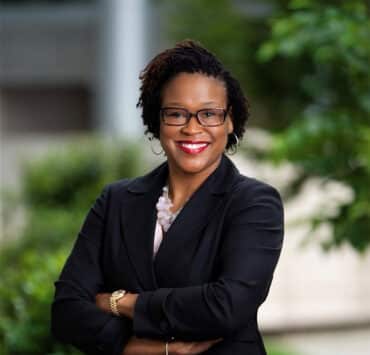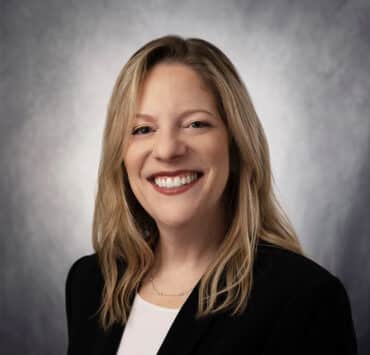|
Getting your Trinity Audio player ready...
|
Before Tom Brown even considered pursuing the law, he had a large reputation to live up to. Brown, who heads IP litigation at Dell Technologies, is the grandson of the late legal East Coast powerhouse couple of Justice Rose Luttan Rubin and her husband, six-decade litigator and firm founder of Herzfeld & Rubin, Herbert Rubin.
Brown’s grandmother became one of the first female New York Supreme Court trial judges. Her husband, unable to get a role at a firm because of his Jewish heritage, built his own business that became an incredibly successful international law firm, on the way arguing the pivotal Supreme Court case World-Wide Volkswagen Corp. v. Woodson that remains good law today.
“For both of them, it was so much more than a job,” Brown remembers. “They were passionate about the notion of justice and the law—and also about philanthropy. They emphasized the need to serve people who are in constituencies where no one else is standing up for them.”
Learning to Let Go
Brown has been a part of Dell since 2016 when it merged with Massachusetts-based storage company EMC. The Harvard Law School grad left his firm work in 2010 after becoming a principal at firm Fish & Richardson. For Brown, it was a chance to do more of what he loved and much less of what didn’t.
“I didn’t have to do doc review anymore or argue about specific deadlines—not to mention the whole world of billable hours,” Brown says. “I love to get into the weeds and the details. When I had the opportunity to lead the IP litigation team, I’ve had to let some of that go in order to let my team do what they do.”
“Tom is a dream client. In all of our cases, he functions at the level of a valued senior partner on the litigation team, where he contributes deeply and substantively,” say partners Brian Rosenthal and Paul Torchia of Gibson, Dunn & Crutcher LLP. “At the same time, he is always mindful of the balance between aggressively litigating the particular case with Dell’s longer-term objectives.”
Brown says that as he’s evolved and risen in his career, he’s had to intentionally focus on his leadership. The senior managing director says he’s most effective as a sounding board and brainstorming partner for his team. At the same time, Brown says he’s valued the opportunity to advocate upward for those under him.
“I want to make sure my team’s contributions are visible outside of our organization,” Brown says. “We’re in a very specialized area, and it’s very different from what other lawyers at Dell do. I have my own cases and still get to go deep on certain cases, but I want to make sure that my team is seen for the great work that they do every day.”
The Best of Both Worlds
When it comes to the highly technical, highly specialized world of IP, Brown says he’s enjoyed delving into the world of post grant review and inter partes review (IPRs). When Brown was leaving his firm, some of his colleagues tried to lure him back because they thought he would be the perfect person to tackle an entirely new practice area.
“I have my own cases and still get to go deep on certain cases, but I want to make sure that my team is seen for the great work that they do every day.”
Tom Brown
Post-grant review work lies somewhere between traditional litigation and the technical world of patent law. “You always have to tell the story and create a compelling narrative, but these are patent judges; you don’t have to distill down as much as you would for a jury trial,” Brown says. “The best IPR practitioners recognize that they still need to treat the decision-maker as a human being, to paint that picture. But it doesn’t have to be filled with those thematic elements [the portrayal of a disputing party as a “bad actor,” for example] that tend to dominate a jury trial.”
But, like so much of his broader work, Brown can’t afford to delve too deep in cases whose technicalities and specificities could fill volumes. Instead, he and his team partner closely with outside counsel, trusting them to ensure the details are right. That leaves Brown and his team free to focus more on ensuring that high-level arguments are persuasive and that technical arguments are synthesized in a way to incur a favorable ruling.
Just ZipIt
Both Tom Brown and his wife left careers in engineering to pursue very different worlds in law and veterinary medicine. But Brown was still able to make a substantive mark in the software world. Barely an adult, Brown created a Macintosh application called ZipIt, a file compression and extraction tool that anyone downloading or sending large files in the late ‘90s may have used.
Service as Subject Matter
Beyond his core work, service has always been a bedrock of Brown’s practice. At firm Fish & Richardson, Brown led several pro bono initiatives including one that involved showing up at housing courts in his local town of Lynn, Massachusetts, to represent tenants in danger of being evicted. Tenants didn’t know they would have representation until they arrived at court, and Brown and his cohorts were often able to negotiate agreements with landlords to avoid the clients being removed from their homes.
It is fairly typical that once a lawyer goes in-house, chances for pro bono opportunities are less frequent. But at Dell Technologies, the legal department created a formal pro bono committee.
One of Brown’s prouder accomplishments is the “Business Leader in Human Rights” award given to his team by immigration services and asylum representation nonprofit PAIR Project.
“This is a pretty unique situation and is rare to find an internal group that’s been this supportive,” Brown says. “Dell values giving back, and our general counsel makes it a priority. Service is important to me, and I’m glad I get to continue finding ways to give back.”
Through his service, his leadership, and his continued efforts to evolve as a leader, Brown is making the kind of impact that would make his grandparents proud.


